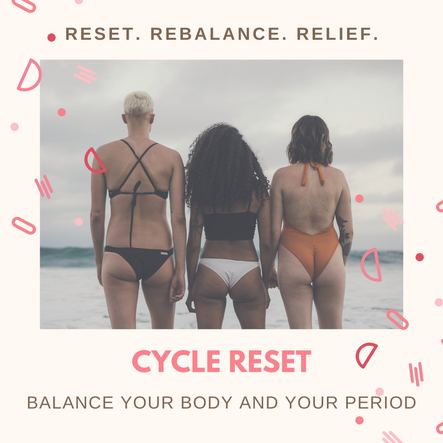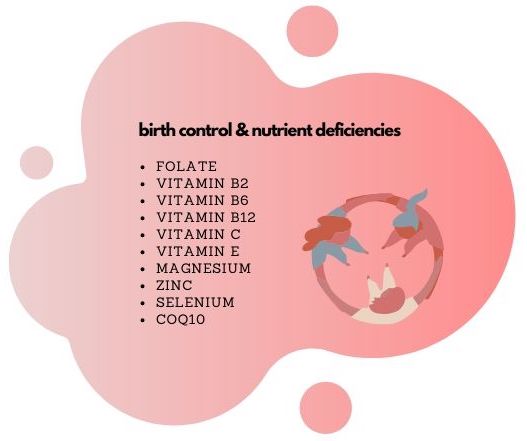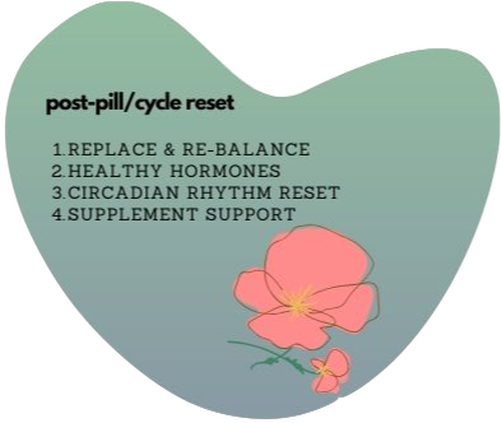The final installation of the “Know Your Cycle” series! Now that you know what a healthy cycle should look like and why, as well as what the signs are that your cycle could use some love, let’s dive into what you can do about it. Please remember that if you’re on birth control, some of these guidelines and recommendations can support your overall hormone health and wellness, but they can’t “fix” your cycle. As long as your body is responding to synthetic, exogenous hormones, a true cycle reset can’t occur. Remember, the “cycle” you experience on birth control isn’t a true cycle, as birth control inhibits or interferes with ovulation, implantation, and doesn’t result in a true bleed. Who needs to do a reset? Well, if you’re coming off of birth control or your cycle is abnormal, this is a great place to start. For a more individualized treatment plan, connect with me and we’ll craft something just for you!
POST-PILL
First, let me say that the following is not meant as a judgement or condemnation of birth control use, but just as a means to fully inform you. Women are rarely getting all the facts when it comes to huge issues surrounding their health. If you’ve had a baby, and pee when you cough, you’ve likely been told this is normal. It’s not. Just like painful, horrible periods aren’t normal. Nor is not having a period for months at a time (unless pregnant or nursing). For instance, did you know birth control use is linked with imbalanced blood sugar and insulin resistance that increases the risk of Type 2 Diabetes? Or that pill users are 85% LESS likely to clear up an HPV infection? Or how about the fact that pill use has been associated with an INCREASED rate of cervical, breast, and liver cancers? And that’s just the increased risk of infection and disease! Pill use can also deplete multiple vitamins and minerals, including folate and vitamin A, both essential for fertility and a healthy baby, and radically disrupt the gut microbiome balance. Additionally, pill use increases the average time to conception from about 4 months to EIGHT! Not to mention many report increased depression, anxiety, mood changes, weight gain, and decreased libido when using the pill. So, with all of that baggage, you can probably see why resetting post-pill is pretty essential, especially before trying for a baby.
| One of the biggest concerns post-pill, beyond having a normal cycle so you can even try to conceive, is the strong likelihood of nutrient imbalances and deficiencies. Correcting these gaps is absolutely one of the highest priorities! Whether you’re aiming to get pregnant or not, ensuring you replace what birth control depleted is essential. While not an all-inclusive list, here are some of the key nutrients that birth control use compromises: |
- FOLATE – essential for cell and DNA synthesis; helps prevent neural tube defects in growing fetus; reverses abnormal cervical cells; may improve mucus production
- VITAMIN A (retinol) – mucosal health; cell differentiation; reverse abnormal cervical cells; potent anti-oxidant
- B VITAMINS (B2, B6, B12, Folate) – crucial in biological processes like metabolism of macronutrients, energy production, mood regulation, DNA and red blood cell synthesis, normal brain and nervous system function
- Signs and Symptoms of inadequacy: fatigue, decreased energy, headaches, confusion, brain fog, mood changes
- Signs and Symptoms of inadequacy: fatigue, decreased energy, headaches, confusion, brain fog, mood changes
- VITAMIN C & E – antioxidants that boost immune function, protect from inflammation and cell damage, and promote healthy skin
- Signs and Symptoms of inadequacy: increased/frequent infections, colds
- Signs and Symptoms of inadequacy: increased/frequent infections, colds
- MAGNESIUM, SELENIUM, ZINC, CoQ10 – assist in hundreds of chemical reactions in the body, including metabolism, hormone regulation, immune function, and disease prevention
**The pill also impairs nutrient metabolism, meaning not only does it deplete some resources, but it also makes it harder for the body to utilize or produce them!
GUT-HORMONE CONNECTION
The gut microbiome, the trillions of microorganisms living within your large intestine, is an integral part to multiple facets of health. Hormone balance is no exception. Within the microbiome is the Estrobolome. This helps regulate hormone balance, specifically estrogen, within the body. The microbes here produce a compound knowns as beta-glucuronidase. One of the ways your body gets rid of toxins and excess hormones is through a process called conjugation in the liver. During this detoxification process, toxins and excess hormones are packaged up (conjugated) into compounds that are water-soluble so that they can be passed through the gut and excreted out of the body. However, if beta-glucuronidase levels are high, the neatly packaged hormones get de-conjugated, allowing them to be reabsorbed by the body, resulting in excess toxins and hormones!
Now, this gut microbiome imbalance can happen regardless of birth control use, but the pill independently causes microbiome disruption. This disruption increases hormone dysregulation, inflammation, and decreases overall absorption in the gut. Again, decreased absorption = decreased nutrients in the system, which is an obvious problem when nutrient needs are already going to be higher when on the pill. And this shift in the microbiome can also further imbalance your pre-pill wacky hormones. Remember, if your hormones/cycle was out of balance BEFORE going on the pill, the pill hasn’t changed that (and could be making things worse!).
The gut microbiome, the trillions of microorganisms living within your large intestine, is an integral part to multiple facets of health. Hormone balance is no exception. Within the microbiome is the Estrobolome. This helps regulate hormone balance, specifically estrogen, within the body. The microbes here produce a compound knowns as beta-glucuronidase. One of the ways your body gets rid of toxins and excess hormones is through a process called conjugation in the liver. During this detoxification process, toxins and excess hormones are packaged up (conjugated) into compounds that are water-soluble so that they can be passed through the gut and excreted out of the body. However, if beta-glucuronidase levels are high, the neatly packaged hormones get de-conjugated, allowing them to be reabsorbed by the body, resulting in excess toxins and hormones!
Now, this gut microbiome imbalance can happen regardless of birth control use, but the pill independently causes microbiome disruption. This disruption increases hormone dysregulation, inflammation, and decreases overall absorption in the gut. Again, decreased absorption = decreased nutrients in the system, which is an obvious problem when nutrient needs are already going to be higher when on the pill. And this shift in the microbiome can also further imbalance your pre-pill wacky hormones. Remember, if your hormones/cycle was out of balance BEFORE going on the pill, the pill hasn’t changed that (and could be making things worse!).
FOOD FIX
One of the ways to help support your system and mitigate the negative effects of birth control pill use is through your diet. I mentioned above multiple vitamins and minerals that are required in increased amounts when on or coming off of birth control. Here are a few of the foods that can help prevent or help you recover from depletion. Please note that in some cases, food sources really may not be enough. For example, there’s research to suggest that B6 depletion by pill use is so significant, that it’s even difficult to out-supplement the depletion. Some studies suggest B6 needs increase by nearly THIRTY times the RDA (recommended amount to consume daily to meet the needs of the average healthy individual) when on birth control.
- Leafy Greens – B Vitamins, Vitamin C, Vitamin E, magnesium
- Almonds – Vitamin E
- Pumpkin Seeds – magnesium, zinc
- Brazil Nuts – Selenium
- Seafood & Shellfish – zinc, B12
- Beans & Lentils – B vitamins, folate, zinc
- Citrus, Strawberries, Tomatoes, Bell Peppers – Vitamin C
- Dark Chocolate – magnesium
- Meat, Eggs, Dairy – B vitamins, zinc
- Probiotics, Fermented Foods, Bone Broth – gut health
NORMAL YET?
So how long does it take to get normal cycles post-pill? For some women, it could happen immediately. The issues prior to going on the pill, what type of pill you were on, how long you were on it, and more all play a role. Know that for many, it takes 9-12 cycles post-hormonal birth control for the cycle to normalize, and 12-18 months for others. If you’re coming off of birth control to try and start a family, this can get even more complicated. Hormonal birth control temporarily decreases ovarian reserve parameters like AMH, antral follicle count, and ovarian volume. Combination pills have been shown to shrink the ovaries by up to 50% and it can take 6-7 months for these ovarian parameters to normalize. Additionally, there’s typically a post-pill transition phase that includes:
-delayed ovulation (and longer cycles)
-irregular cycles
-short luteal phase
-abnormal mucus production
-irregular bleeding/mid-cycle spotting
ALL of which are not at all conducive to fertility! In fact, hormonal birth control is associated with a temporary delay in the return to normal fertility. Compare below...on average, it took “x months” to conceive:
-4 months if previously using condoms as birth control
-6 months if previously using progesterone only birth control
-8 months if previously using combination pill or IUDs
-10 months if previously using implant for birth control
-15 months if previously using injected contraceptive
Suffice to say, if you’re thinking of stopping your birth control to get pregnant, you’ll want to do so well in advance!
POST-PILL SIGNS & SYMPTOMS
Let’s look at some additional things to watch out for and think about post-pill that suggest imbalance. Irregular or skipped periods are quite common as your body tries to figure out how to rely on its own endogenous hormones again, sometimes after years of being dormant. Heavy bleeding is also super common, especially if you went on the pill in an attempt to stopheavy bleeding. Remember, birth control doesn’t fix the underlying issues, it simply masks them. Ovulation pain and cramps, thanks to often a lack of ovulation for the duration of the pill use, as well as hormone imbalances leading to excess uterine lining proliferation. Breakouts may also get worse! Birth control decreases testosterone; as testosterone levels come back up, this can result in acne. Bloating is another common issue. Progestin in birth control can act as a diuretic, resulting in the excretion of fluid. When birth control is stopped, you may find you start retaining fluid. As the body re-balances, this post-pill bloating should resolve. And just like the hormones of birth control may cause mood swings, coming off of them and the subsequent radical shift in hormones, can also result in massive mood changes. Finally, don’t forget about those nutrient deficiencies! The longer you were on birth control, the more likely they are to be significant. And if you’re hoping to start trying for a baby, going into pregnancy depleted is a recipe for disaster.
RESET
So, what do you do? How can you get that period back on track, post-pill or just in general? The following is a general guideline for resetting post-pill. Note that in most instances, it will take several months and a few cycles for things to change and become normal and optimal. This is a great overview, but it really, truly works best if you’re working with someone who can tailor the steps to YOUR specific symptoms, needs, and considerations. You’re unique; your plan to wellness should be too.
Replace and Rebalance
1) Replace Nutrients – Bs, C, E, magnesium, selenium, vitamin D, zinc, preferably via food, primarily, but also with tailored vitamins
2) Balance Blood Sugar – protein, fat, veggies; regular moderate exercise
3) Potentially ditching certain inflammatory foods/triggers
Hormone Balance
1) Restore Gut – Improve Estrobolome health; fiber, probiotic, etc.
2) Support Estrogen Metabolism – with liver love! Cruciferous veggies, tailored herbs, avoiding environmental estrogen exposure
3) Daily Bowel Movements!
Reset Circadian Rhythm & Stress Support
1) Limit Blue Light
2) Lower Light in house
3) Consistent Bedtime and wake
4) 7-8 hours of quality sleep
5) Stress Management
6) Adrenal Support
Targeted Herbs & Supplements
1) Vitex can help with regulating ovulation, increasing fertility, and improving progesterone
2) Vitamin C improves ovulation and progesterone
3) Targeted supplements for PCOS, endometriosis, conception, etc.)
Your cycles CAN be healthy, balanced, and no more than a minor annoyance, but it definitely doesn’t just happen overnight. If you’re looking to balance your cycle, recover from pill depletion, or prepare for pregnancy, I encourage you to get started ASAP! The journey takes time, but is so worth the outcome! Your period doesn’t have to be something you dread. Take control of your health; start with taking control of your cycle.
So, what do you do? How can you get that period back on track, post-pill or just in general? The following is a general guideline for resetting post-pill. Note that in most instances, it will take several months and a few cycles for things to change and become normal and optimal. This is a great overview, but it really, truly works best if you’re working with someone who can tailor the steps to YOUR specific symptoms, needs, and considerations. You’re unique; your plan to wellness should be too.
Replace and Rebalance
1) Replace Nutrients – Bs, C, E, magnesium, selenium, vitamin D, zinc, preferably via food, primarily, but also with tailored vitamins
2) Balance Blood Sugar – protein, fat, veggies; regular moderate exercise
3) Potentially ditching certain inflammatory foods/triggers
Hormone Balance
1) Restore Gut – Improve Estrobolome health; fiber, probiotic, etc.
2) Support Estrogen Metabolism – with liver love! Cruciferous veggies, tailored herbs, avoiding environmental estrogen exposure
3) Daily Bowel Movements!
Reset Circadian Rhythm & Stress Support
1) Limit Blue Light
2) Lower Light in house
3) Consistent Bedtime and wake
4) 7-8 hours of quality sleep
5) Stress Management
6) Adrenal Support
Targeted Herbs & Supplements
1) Vitex can help with regulating ovulation, increasing fertility, and improving progesterone
2) Vitamin C improves ovulation and progesterone
3) Targeted supplements for PCOS, endometriosis, conception, etc.)
Your cycles CAN be healthy, balanced, and no more than a minor annoyance, but it definitely doesn’t just happen overnight. If you’re looking to balance your cycle, recover from pill depletion, or prepare for pregnancy, I encourage you to get started ASAP! The journey takes time, but is so worth the outcome! Your period doesn’t have to be something you dread. Take control of your health; start with taking control of your cycle.



